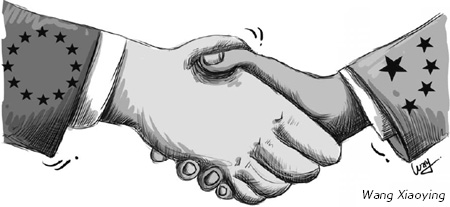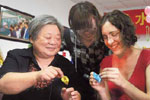Dan Steinbock
Caught between optimism and caution
Updated: 2009-12-02 07:54
By Dan Steinbock (China Daily)

Decades ago, Henry Kissinger asked: "Who do I call if I want to call Europe?" After intense haggling over two new top posts, Herman van Rompuy was appointed president of the European Council, and Catherine Ashton, the foreign affairs high representative of the European Union (EU).
Since the EU now has a new collective leadership under the recently enacted Lisbon Treaty, Beijing hopes its member states will be more coordinated on their policies toward China.
These appointments acquired a special meaning, coming only days before the 12th China-EU summit in Nanjing on Monday, at which Premier Wen Jiabao, European Commission President Jose Manuel Barroso and Swedish Prime Minister Fredrik Reinfeldt, who holds the EU's rotating presidency, were present.
But behind Brussels' (EU headquarters) facade, concern over trade and monetary matters is rising.
In 2008 the EU and China launched a new strategic mechanism for driving their trade and economic policies. In Brussels, China is increasingly perceived as an important challenge for EU trade policy. Over the past few months, European officials have become concerned that the rising value of the euro is harming the bloc's exports, which they believe is giving a competitive advantage to the US and China.
The EU and China are two of the biggest traders in the world. Their bilateral trade continued to increase substantially last year. The EU is China's biggest trading partner. Conversely, the EU's open market has been a large contributor to China's growth.
Right before the summit, China's Vice-Foreign Minister Zhang Zhijun said: "China will increase the flexibility of the yuan's exchange rate at a controllable level in the future." He was echoing the views of China's central bank. This would certainly please the key EU leaders of monetary matters, including Eurogroup President Jean-Claude Juncker, Economic Affairs Commissioner Joaquin Almunia and European Central Bank President Jean-Claude Trichet.
While the EU leaders wanted China to de-peg the yuan from the US dollar and revalue it, Premier Wen reiterated Beijing's long-standing position that the yuan's exchange rate be kept at a reasonable, balanced level.
For all practical purposes, the evolution of EU-China relations has long been driven by the trilateral relations, that of the US, China and Europe. But things may be changing. Just about two weeks ago, US President Barack Obama's first visit to China sparked excitement on both sides of the Pacific. Across the Atlantic, the mood was somewhat different. Before the visit, Obama's absence from the German celebration marking the fall of the Berlin Wall and the Cold War reinforced concerns of marginalization.
During the Bush era, Europeans were worried over Washington showing too much interest in dictating Europe's role in the "war against terror". Today, European Atlanticists are worried that the new US president is showing too little interest in trans-Atlantic relations.
Unlike Washington, Brussels does not have a direct security presence in the Asia-Pacific region. During the Bush era, differing views over America's unilateral security policy and the war in Iraq contributed to deterioration in US-EU relations. But the fallout also boosted cooperation between the EU and China.
Those years came to an end around 2006-07. As the influence of neo-conservatives has waned in Washington, China's rise, as well as a set of issues (for example, trade, security, energy and the environment) has contributed to increasing debate between Brussels and Beijing.
The optimistic scenario is that the EU-China relationship is maturing. The pessimistic one is that it will be characterized by increasing friction. Despite pressures, the realists expect reason to prevail.
Historically, the main objectives of the EU policy toward China comprise the effort to broaden and deepen dialogue with China, bilaterally and on the world stage. The EU hopes to support China's transition into an open society, too.
Furthermore, the EU seeks to encourage the ongoing integration of China into the world economy and trading system, while raising its profile in China.
In recent years, however, efforts to influence China's direction have increased. A year ago, EU-China talks were suspended because of disagreements on Tibet and human rights issues. In Europe, a new opinion climate was reflected by an influential report of the European Council on Foreign Relations last April. In the report, China is seen as exploiting the EU's divisions on various issues. It is predicated on the idea that the EU policy has roots in a time when China was still a developing country rather than a "diplomatic competitor". The internal division of Europe and its outdated strategy is leading to failure across EU's domestic and foreign policy agenda, including trade, human rights and foreign policy, the report contends.
In the aftermath of the global economic recession, structural problems will haunt Europe in the foreseeable future, which is likely to reinforce both EU assertiveness and its internal division. The frustrated euro hawks see the bloc as an economic giant, but a political dwarf. In reality, the EU economy has not been insulated to global crises. In recent days, Dubai's debt crisis has unnerved investors worldwide. Western European banks are not only highly exposed to debt problems in Eastern Europe but their claims to the United Arab Emirates also amount to more than $93 billion.
With the Copenhagen climate conference round the corner and the fragile global recovery, the China-EU summit was focused on the prospects of a new strategic partnership. Despite escalating rhetoric, the China-EU summit has highlighted areas of common interests and ways to promote cooperation and reconciliation, including the EU's effort to triple student exchanges with China by 2018.
And though Brussels differs with China on climate change issues, it has welcomed Beijing's first firm target to curb greenhouse gas emissions. The EU and China both have vowed to oppose protectionism, which has a potential to disrupt the fragile global recovery. Washington and Brussels are united by similar values and interests. The US and China may differ on values, but their interdependent economies underscore converging interests. In the same way, Brussels and Beijing may not share similar values, but their economies are becoming increasingly interdependent - and that translates into converging interests.
The EU-China summit was held in Nanjing, capital of Jiangsu province, which accounted for 18 percent of the China-EU trade volume last year. But Nanjing is also a historical city both for the Chinese and the Europeans. After all, the "century of humiliation" - or the period of subjugation China suffered under imperial foreign powers, especially those from Europe and Japan - originated from the Treaty of Nanjing, signed in 1842.
Today, Europeans are all too familiar with history to take the rising assertiveness too far. China and the EU both seek to agree on disagreements and to strengthen what unites the world's largest nation and the world's largest bloc.
The author is the research director of International Business at the India, China and America Institute, an independent think tank in the US.

(China Daily 12/02/2009 page9)
Specials

China dream
Popular Bluff, Missouri, native Catherine Beck never imagined her summer experiences in China would change her career course.